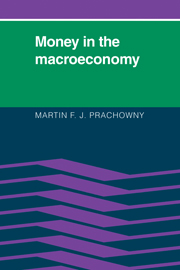Book contents
- Frontmatter
- Contents
- List of charts, figures, and tables
- Preface
- List of symbols
- 1 The roles of money and monetary policy in the macroeconomy
- 2 A model of the macroeconomy
- 3 The new classical model: the case against stabilization policy
- 4 The institutionalist model: the case for stabilization policy
- 5 The demand for money
- 6 The supply of money
- 7 The monetary mechanism
- 8 U.S. monetary policy and the dilemma of stagflation
- 9 A model of an open economy
- 10 Managed exchange rates and monetary policy
- 11 Monetary policy in Canada and its macroeconomic consequences
- 12 Improving the monetary policy apparatus
- Index
1 - The roles of money and monetary policy in the macroeconomy
Published online by Cambridge University Press: 26 October 2011
- Frontmatter
- Contents
- List of charts, figures, and tables
- Preface
- List of symbols
- 1 The roles of money and monetary policy in the macroeconomy
- 2 A model of the macroeconomy
- 3 The new classical model: the case against stabilization policy
- 4 The institutionalist model: the case for stabilization policy
- 5 The demand for money
- 6 The supply of money
- 7 The monetary mechanism
- 8 U.S. monetary policy and the dilemma of stagflation
- 9 A model of an open economy
- 10 Managed exchange rates and monetary policy
- 11 Monetary policy in Canada and its macroeconomic consequences
- 12 Improving the monetary policy apparatus
- Index
Summary
INTRODUCTION
“Money is what makes the world go 'round,” as the old saying has it; but would an absence of money stop the world in its tracks? Probably not. Barter trade, in which people search out one another in an attempt to exchange things they do not want for things they do, would still enable us to survive, but barter trade requires a double coincidence of wants: Two people with exactly opposite requirements must find each other. This is time-consuming and wasteful of resources. It might not be easy for a candlestick maker who wants to exchange a surplus candle for a loaf of bread to find a baker who wants to trade bread for a candle and then to negotiate an acceptable exchange ratio between these two goods. This process would have to be repeated many times over as the candlestick maker tries to exchange his output for all the other goods and services that satisfy his wants. Market activity, which processes their transactions, uses up real resources that do not directly satisfy these wants; it is therefore desirable to minimize the costs of these activities. Perhaps “specialists” would appear who would help buyers and sellers to find each other and to consummate their transactions. But these markets would be rather small and thin, and specialists could not earn enough to justify their activities. In essence, barter trade fragments markets.
- Type
- Chapter
- Information
- Money in the Macroeconomy , pp. 1 - 18Publisher: Cambridge University PressPrint publication year: 1986



